BY ROB FELD
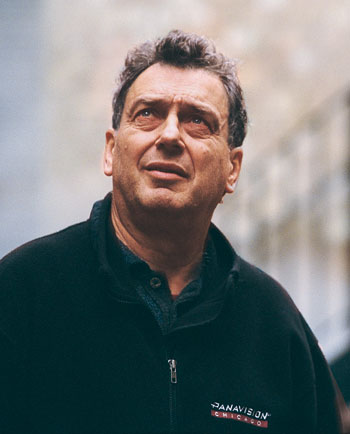 KINDRED SOULS: Stephen Frears shares
KINDRED SOULS: Stephen Frears shares
Hitchcock's affection for constructing films
around taboo. (Credit:Miramax Film Corp.)
"The first time I saw this film was a very foggy night in the 1970s. They must have re-released some of his films," says Stephen Frears as we sit in a screening room in Miramax's New York office, preparing to watch Alfred Hitchcock's 1946 classic
Notorious. "It's such a complicated and shadowy film. Very clever. I was thinking about
Notorious a lot when I shot
Dangerous Liaisons because it always seemed like a film noir to me, which is really what
Notorious is."
From a script by Hitchcock's frequent collaborator, the great Ben Hecht, Notorious stars Ingrid Bergman as the fast-living Alicia Huberman, whose father was a Nazi agent operating in America. Alicia is approached by an American agent named T.R. Devlin (Cary Grant) and asked to insinuate herself into a group of her father's friends, prominent Nazi refugees presumably hatching some kind of nefarious plot in the Brazilian home of Alexander Sebastian (Claude Rains).
Frears settles back and sips his coffee as the film opens with the sentencing of Alicia's father, and then proceeds to a party in the living room of Alicia's house. The shadowed figure of a man's back (Grant) is positioned in an armchair, center screen. "It's good to play a whole scene on somebody's back, and yet it's focused so clearly on him," Frears says as the party continues and Alicia flirts with the man, who remains stoically still, his face completely obscured.
"What do you think they said at the studio when he shot Cary Grant's back? It's so impertinent," Frears chuckles. Grant never moves or says a word but the camera keeps him in the foreground. The scene is captured in a single take until it fades out on a close-up of the back of Grant's head. "Fantastic. He's also letting you know this is not going to be a naturalistic film," Frears says, his eyes glued to the screen.
"There are two ways you can do things," Frears explains as he watches Alicia flit between her guests. "You can cut between shots or move the camera (or the actors) around to put the emphasis in the right place. This scene is wonderful; you know absolutely what the shot is about. It has such narrative speed and focus." Indeed, the exposition has been dispensed economically as Alicia's party-girl persona and Devlin's stoic, withholding nature, have been revealed through simple observation.
Frears marvels at how Hitchcock cuts from over the shoulder close-ups of Bergman to close-ups of Grant, laying out the grammar of the film, which is shot significantly in close-up. "On Liaisons I learned the hard way that shooting close was the only way I could make the film work because every word was a lie, and only when you went close could you see the dishonesty, and understand the implications of the lie. So the scenery has to stay in the background, never be put into focus. I remember hiring the designer and costume designer and saying if people come out talking about the scenery, I'll think I failed."
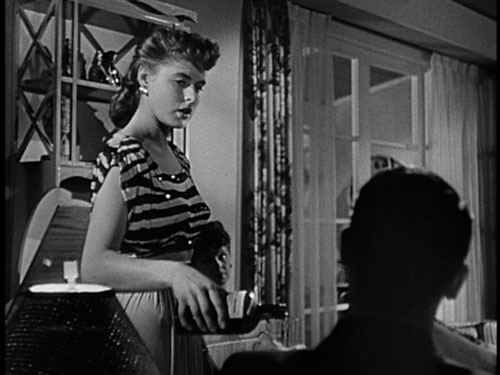 FLIRT: Party girl Ingrid Bergman meets Cary Grant in the film's opening scvene,
FLIRT: Party girl Ingrid Bergman meets Cary Grant in the film's opening scvene,
but the audience only sees his back. (Screenpull: RKO/The Criterion Collection)
It's now the next morning and Devlin appeals to Alicia's patriotism to convince her to become a spy, instead of joining her friends on their yacht. As her friend enters, Alicia steps into the foreground to the left of the frame, while Devlin sits behind her frame right, watching Alicia to see what she's going to do. It seems a very natural positioning and both of their faces express what they're thinking. "That's what I'm always trying to do," Frears points to the screen. "If I can get two faces looking forward, I've struck oil because I can play on the interchange. When you can do it without a cut, that's what you're always after.
"When it's about what's not being said," adds Frears, "it has to be about the actors' faces and the continuity. In The Queen, the main character is famously reticent and doesn't express herself, so you have to have characters around her telling the story. 'Oh, the Queen's going to do this.' Then you can cut to her face expressing, through her inexpressiveness, what she can't express. I remember quite clearly realizing it. 'Oh, I see, they have to tell the plot because she can't express her feelings.' You have to work quite hard. It won't happen by accident."
The action now shifts to Rio where Alicia and Devlin have begun a love affair, holed up in a romantic hotel room awaiting her assignment. Hitchcock follows the lovers, largely in one close-up, for over two minutes as they kiss and speak softly on the patio, move through the room and talk on the telephone, all the while draped over each other. "All Hitchcock has done is take them from the balcony and bring them back, and yet it's so original," Frears shakes his head in appreciation of the technique. "And you never feel he's lost control of it, that it goes on too long. It's so sexy and so provocative, so cheeky. Take a phone call while kissing! It works because the actors are so confident, they can hold the camera."
After Devlin is told by his superiors that Alicia's unsavory mission is to get Sebastian to marry her, he returns to the hotel, conflicted, to find Alicia burning a chicken in domestic bliss. Alicia picks up on the change and tells Devlin, "You'd better tell mama what's going on or all this secrecy's going to ruin my little dinner." This shot echoes the close-up kissing shot of the previous scene, as Devlin waits for her to refuse the mission without saying so. "Brilliant continuity," comments Frears. "Put this scene against the other one. Let the audience know all the subplot.
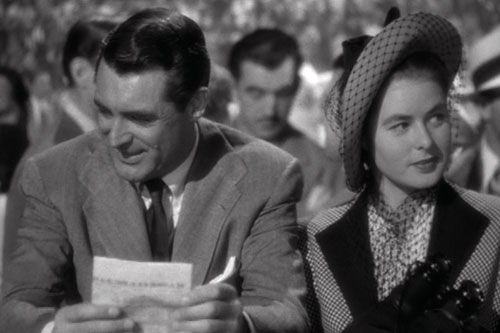
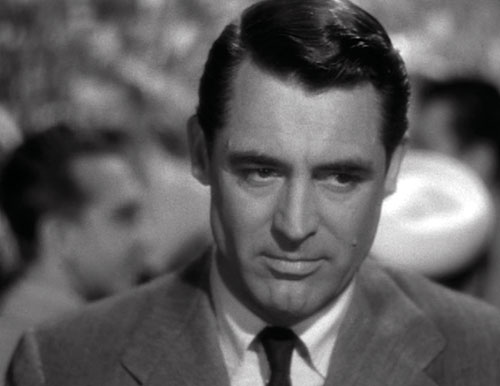 REPRESSED: A two-shot at the racetrack hides the pain
REPRESSED: A two-shot at the racetrack hides the pain
Grant is feeling until Hitchcock moves in for a close-up."He won't tell her he's in love with her," Frears shakes his head, chortling with the irony. "It's such a grubby plot, isn't it? Fall in love with a girl and your job is to make her marry another man. It's so squalid, coded and concealed, constructed entirely about not being able to say what's going on. The Queen is another film constructed around a taboo. I always like doing that."
Alicia begins her charade, and it's not hard work—Sebastian has been in love with her for years. He invites her to dinner and as they sit in an intimate restaurant booth, she maneuvers to earn his trust. "Hitchcock lowers the voices very noticeably," Frears realizes, leaning forward in an attempt to pinpoint the change. "Normally you want the actors giving it a bit of oomph, but Hitchcock is having them do the exact opposite. They play with this romantic intensity but underplay it at the same time, in a very unusual way. Rains plays it so low-key and intense. That's real skill."
Alicia prepares for her big coming-out party at Sebastian's house, while Devlin's boss, Prescott (Louis Calhern), helps her don a necklace rented for the occasion. Devlin stands silently facing them, back to the camera. Alicia's eyes are averted as she banters with Prescott, unable to say what she's feeling to Devlin. "She's going to glance at him... she's going to glance at Cary Grant," Frears leans forward in near gleeful anticipation. "There!" And, indeed, Alicia glances up to share a covert moment with Devlin. "That's what you do a shot like that for. You get all the people in the right places. They got the cut right and the audience is taken through the narrative."
Frears now notices Hitchcock's remarkably smooth blocking. In the shot, Grant crosses to stage right, then wanders diagonally to upstage left. Bergman and Calhern turn in profile. "Look at the way the director takes him over there," marvels Frears. "You know absolutely what's going on underneath that isn't being said. It is so masterly. Nowadays, realism is prized and you would do it all with cuts. This is pretend; it takes place in a film clearly made in a studio. The world has completely changed."
In another extraordinary shot, Alicia arrives at the house and watches from a distance as her new nemesis, Sebastian's mother [Madame Konstantin], descends the great and famous staircase, eerily moving in and out of light, and glides up to her and into a close-up. It's a long and strangely agonizing take. "Very expressionist, isn't it?" Frears suggests. "Hitchcock's generation learned it all at cinema clubs where they'd see the great German films—Fritz Lang, and the like."
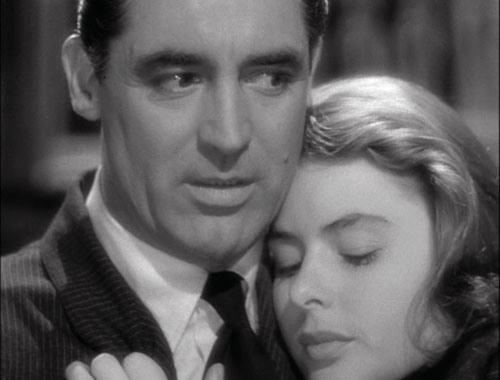
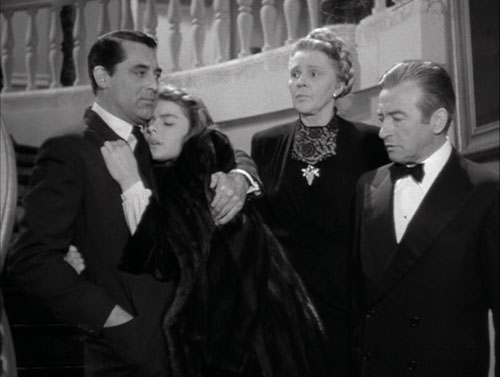 GREAT ESCAPE: As Grant escorts Bergman to safety,
GREAT ESCAPE: As Grant escorts Bergman to safety,
Hitchcock cuts from the intimate to the consequences.
(Screenpulls: RKO/Criterion Collection)Now taken into another room, Alicia is introduced to the Nazi dinner guests, in turn. "Hitchcock wants you to know the geography here, because it's going to be important later on, people being in different rooms." Taking her seat in the dining room, Alicia notices one of the guests making a silent scene over the film's MacGuffin, a wine bottle in which uranium is being hidden. "It's so crude," Frears says of the moment. "No worry about subtlety. It's just a director doing his work. The audience has to know something, so let's get on with it."
Caught up in the action, Frears mutters at the screen as the poor victim of this mishap is led off by his Nazi pals. "They're going to kill him."
A few moments later, Alicia sneaks away from Sebastian at the racetrack to have a clandestine meeting with Devlin. "Wonderfully crass," says Frears, "people speaking out of the sides of their mouths." Standing at the railing in a two-shot, they murmur information to each other. Alicia takes the opportunity to confirm Devlin's worst expectations, that she has added Sebastian to her "list of playmates," and Hitchcock cuts to a close-up of Devlin's repressed pain. "That was what Hitchcock was waiting for. He uses the two-shot, then, when the emotion hits, he goes in. Very economical. The one-shots are the ones with intensity and the others are more functional—banal almost—covering everything up."
Sebastian has asked Alicia to marry him and she has convinced him to throw a party in her honor at the house, with Devlin invited to snoop around and find out what was so special about that bottle of wine. Hitchcock moves his characters about the party like chess pieces: a jealous Sebastian, a scheming Devlin, a suspicious mother, a love-torn Alicia. "He's weaving the sexual intrigue and plot together at the same time. Brilliant narrative," says Frears.
As Devlin smokes outside the garden door, through the window we see Alicia's shadow and then Alicia descending the stairs in the background, coming to sneak Devlin into the wine cellar. "This is brilliant design," says Frears. "Hitchcock would have drawn the shot. He had the whole set designed and built for that one shot. He deliberately put the window in the door. Clever bugger! I can't do it on paper."
Just then Sebastian follows in a similar shot and Devlin kisses Alicia to conceal their true activity. Sebastian is crushed but lets Alicia explain it away. "It's sort of perfect, bringing all those things together at one moment," Frears says. "The sexual tension and plot are so well-integrated."
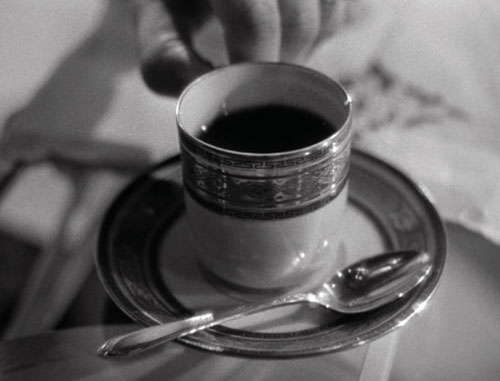 THE AROMA OF DEATH: The near lethal cup of coffee.
THE AROMA OF DEATH: The near lethal cup of coffee.
(Screenpull: RKO/The Criterion Collection)Her real mission now uncovered, Alicia is soon bedridden from arsenic administered in gradual doses by Sebastian and his mother. She misses an appointment with Devlin who gets nervous and goes to the house, creeping up to her bedroom. There is a close-up of her weakened face and then she spots him approaching. "Devlin crosses the room from her point of view, so the emphasis has been changed," Frears notes, charting their movements with his hands. "If Hitchcock had done it in a side shot, it would have been more detached, more with Devlin. By cutting to her, it means the approach to the bed has the intensity of what she feels."
Devlin pulls Alicia up and walks her, in close-up, to the great stairs to make their escape. "Now, this is brilliant," Frears exclaims, leaning forward and gesturing with his hands as if to help them down the stairs. "If you shoot like this on a staircase, with longish lenses, people bounce when they go down from stair to stair. The camera is on a crane but he's designed the staircase with some kind of gradient in it so that they could do a gentle descent. There's a shot in Liaisons where John Malkovich and Glenn Close come down a grand staircase, which I had to shoot on location. It only started to work when John half-carried Glenn down the stairs, taking all her weight. Hitchcock had obviously designed the whole staircase, knowing that Cary Grant and Ingrid Bergman would come down in close-up."
Devlin and Alicia make their escape into the night and to safety, leaving poor Claude Rains behind to certain death at the hands of his co-conspirators. "No shoot out. Just leave him there," Frears nods in appreciation.
Frears has seen Notorious many times since that foggy night, but he is still amazed to discover something new. "I hadn't made the connection to the way Hitchcock used close-ups. Now I see he shot this way because it evokes what was not being said. I'm sort of enchanted to have stumbled onto what he had worked out. It's fantastic."